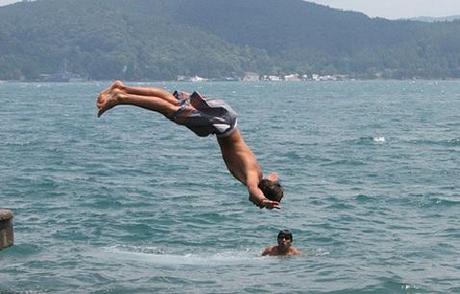
Image by Beny Shlevich
In the weeks before your holiday you’re busy planning for that exciting moment when the plane lands and your holiday begins. If you have your tickets, passport, luggage and heaps of enthusiasm you may think you’re prepared, but there are several things you should remember to research and organise, which will ensure you keep the risks of your holiday to a minimum.
Holidays should be happy, relaxing and rejuvenating – an experience to remember for all the right reasons. Here are six common accidents and how you can reduce your chances of a trip to A&E on holiday.
1. Traffic Accidents
Although the open road can be an exciting adventure, driving abroad is one of the most dangerous things you can do on holiday. This doesn’t mean you should avoid it, just that you need to plan carefully.
One of the main problems with driving abroad is that the laws and customs can vary a lot, depending on where you are in the world. Before you set off, make sure you have familiarized yourself with the way people are expected to drive in that country, otherwise you could be putting yourself and your family in unnecessary danger.
Similarly, you should ensure that you can read enough of the language to understand the road signs. You might think a sign is telling you to keep to the left, when in fact it’s instructing you to slow down. A simple misunderstanding through a language barrier could lead to a serious accident.
It can be very difficult to navigate through an unfamiliar country, so it’s helpful to plan your route beforehand, so that you feel more confident driving. If you can, stick to quiet roads which are safer.
When choosing a car rental company, do your research and pick a trustworthy company. See if your travel agent can recommend one for you. You need to ensure that you rent a reliable and safe car for your holiday.
In general, only drive abroad if you are an experienced and confident driver, as it can be more challenging than you imagine. Always make sure that you have the correct insurance to drive abroad – double check with your insurance provider if you are unsure.
Pedestrians are also likely to have an accident, particularly while crossing chaotic roads in busy cities. If you are unfamiliar with the laws of traffic in the country, make sure you cross at traffic lights. Another important thing to remember is to never assume that cars will stop at a zebra crossing. Different countries have very different attitudes to how a zebra crossing works and so you could get caught out by assuming the laws from your home country apply here.
2. Swimming Pool Accidents
Splashing into the cool, shimmering pool is just what many holidaymakers are fantasizing about on the plane and yet swimming pool accidents make up a large majority of the total accidents on holiday. This is mainly caused by a relaxed or over-excited attitude on behalf of the holidaymaker, or neglect on behalf of the hotel.
It’s easy to get carried away and forget basic safety measures whilst abroad. For instance, you could jump in the pool without noticing that there isn’t a lifeguard on duty. This is a great example of how basic safety measures can be neglected by the hotel and also unnoticed by you, so make sure this is one of the first things you check before diving into the water.
As tempting as a nice fruity cocktail can be, try to avoid combining alcohol and swimming. Similar to how you would avoid swimming after a heavy meal. Things can easily go wrong if you treat the pool like a restaurant/ bar.
Another thing to check is to make sure the pool hygiene is good; a neglected pool could be home to millions of nasty bacteria that could ruin your holiday.
Most accidents occur on the first day of your holiday, where there is this rush to get out in the pool for the holiday to begin. Instead, try to spend the first day relaxing and exploring your holiday destination.
3. Sports Accidents
Holidays are a great opportunity to try a new sport and it can make your holiday a really exciting experience. However, it can also be an accident waiting to happen if you don’t have the appropriate training and safety equipment.
You need to make sure that there are trained instructors providing supervision and guidance and that the activity takes place in a well-run, safe environment with all the proper sports equipment. The best way to find a reputable center is to ask your hotel or holiday agent to recommend places that they know and trust.
4. Food Poisoning
If you’ve ever experienced food poisoning you’ll know how awful the experience is – it’s certainly one of the last things that you’d want to happen on holiday. However, you have increased risk of this happening whilst on holiday because you are likely to be eating out for nearly all of your meals – meaning you have no control over how your food is prepared.
The only things you have control over is where you eat and what you eat, which can help you minimize the chances of spending the rest of the holiday vomiting. Choose a well-presented restaurant that appears to have high level of cleanliness. If the tables are sticky in the dining area, then chances are, there will be similar standards or worse in the kitchen.
Other great tips include: make sure you only drink bottled water and to wash your hands frequently, particularly before a meal. When you are out exploring the area, avoid street stalls as you cannot be sure of the hygiene standards.
If you are unsure about the hygiene standards of a place, try to only eat hot food, or raw food that can be peeled like a banana. Also, avoid seafood and raw dairy products.
5. Balcony Falls
Balconies are a lovely feature for any hotel room, as they allow you to soak up the view and catch some rays from the comfort of your room. Here are some tips to make sure this beautiful feature doesn’t become the site of an accident.
Make sure there is a strong and tall fence around the balcony’s edge. Also ensure that children are not left on the balcony unattended.
6. Slips and Trips
Unfamiliar surroundings, excitement and alcohol are a potential recipe for disaster. You are much more likely to fall badly abroad, particularly if you’ve been drinking.
To reduce the risks of tripping or slipping, avoid wearing flip flops or high heels. If you have to walk a fairly long distance, wear sensible footwear. Wearing some painful toe-busting sandals could at best leave you with horrible blisters or worse: a broken ankle.
On top of all this, you should make sure you have travel insurance as well as international health insurance before setting out on your trip. This way, if the worst did happen, you’ll have the support and help you need.
If you have an accident which is the fault of a hotel, restaurant or activity center then you should make a personal injury claim. However, the best way to prevent an accident is through good research and planning. Make sure you research the language and customs of the country you are visiting, as well as think carefully when choosing a hotel, restaurant, activity or route.
Do you have any travel safety tips? Have you ever had an accident abroad?
Featured images:
- License: Creative Commons image source

Gavin Harvey has two main passions in life: travel and fitness. He loves to travel the world, trying out new sports along the way and blogging about his experiences. He writes for The Accident Specialists.


